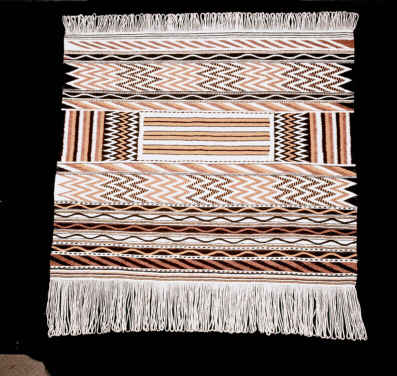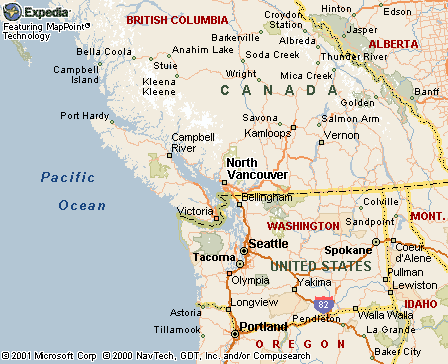|
|
Canku Ota |
|
|
(Many Paths) |
||
|
An Online Newsletter Celebrating Native America |
||
|
March 9, 2002 - Issue 56 |
||
|
|
||
|
The Struggle for B.C.'s Languages |
||
|
by Peter Driver The
Province
|
||
|
Musqueam Weaving
|
 Trying
to save a language in a place with an English-speaking majority is like
trying to rescue a non-swimmer from a flood. Trying
to save a language in a place with an English-speaking majority is like
trying to rescue a non-swimmer from a flood.
Victor Guerin, for one, has dived right in, but he's still swimming against the current. All of BC's native languages are sinking into oblivion -- at least six have already disappeared -- and of the 26 or so survivors, Musqueam is critically endangered. It has only one fluent speaker remaining, 91-year-old Adeline Point. Guerin, who is one of a handful of semi-fluent speakers, began teaching the complex language to kids at the reserve's preschool last spring. Daily, for 15 minutes or however long he can keep their attention, he goes over numbers, body parts and animals and their sounds. Last September, in a new program funded by the band, he began teaching the language two days a week to some of the Musqueam children who attend Southlands Elementary, a west-side Vancouver public school nearby. It's part of a B.C.-wide -- even worldwide -- push within the last 20 or 30 years to try to save aboriginal languages. To many of us, language is just a means of communication. How important is it for the First Nations to save their languages? "It's fundamental to our cultural identity," says Guerin. "Culture and language are inextricably intertwined. If you lose your language, you lose a major aspect of your culture." "Language encodes so many of our values, beliefs and philosophies," said Peter Jacobs, who teaches the Squamish language at Carson Graham Secondary School in North Vancouver. "Any time you translate, a lot gets lost." Like Musqueam, Squa-mish is part of the Coast Salish language group but, according to Jacobs, the two are as different as Spanish and Italian. Dr. Patricia Shaw is a non-aboriginal who is just as passionate about saving BC's languages as Guerin or Jacobs. The linguist started the First Nations Language Program at UBC six years ago and now offers Musqueam as a four-year credit course. "One of the things about B.C. that's so special is we've got an amazing diversity of languages," said Shaw. "We've got eight genetically distinct language families in BC" Not to mention more than half of Canada's 50 native languages. "That's something the average British Columbian has no idea about. We've got this amazing heritage here. The rest of the world, in terms of academic interest, is very focused on British Columbia." So will Musqueam and Squamish go the way of Tsetsaut, Nicola, Pentlatch, Sooke, Semiahmoo and Comox? Or do they have a chance to survive? "My greatest hope for the preservation of the language is with the preschoolers," said Guerin, who is working hard at becoming fluent himself. "Younger children have that inherent ability to learn languages. In fact, they're picking up a lot of concepts of the language that third- and fourth-year university students are struggling with." Jacobs says classrooms alone aren't enough to save his language, which has fewer than 20 fluent speakers. "Obviously, living in the city, we're immersed in English. We're trying to create an atmosphere where the language would be naturally used in the community. "People need to take their own initiative to speak the language in ceremonies and with their families." A BIGGER ALPHABET Because they have so many sounds not covered by our alphabet, First Nations languages are usually printed with universal phonetic symbols. The UBC First Nations Language Program has developed a font mixing English letters with the symbols. It is used across North America.
|
||||||||||
|
|
||
|
|
||
| Canku Ota is a free Newsletter celebrating Native America, its traditions and accomplishments . We do not provide subscriber or visitor names to anyone. Some articles presented in Canku Ota may contain copyright material. We have received appropriate permissions for republishing any articles. Material appearing here is distributed without profit or monetary gain to those who have expressed an interest. This is in accordance with Title 17 U.S.C. section 107. | ||
|
Canku Ota is a copyright © 2000, 2001, 2002 of Vicki Lockard and Paul Barry. |
||
|
|
|
|
|
The "Canku Ota - A Newsletter Celebrating Native America" web site and its design is the |
||
|
Copyright © 1999, 2000, 2001, 2002 of Paul C. Barry. |
||
|
All Rights Reserved. |
||

